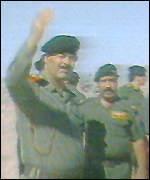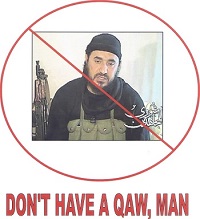Posted on May 27,
2015
“What We Know Now”
Iraq revisionism is not knowledge
by
Daniel
Clark
“Knowing what we know now, would you have authorized
the invasion?” That was the question
that Fox News anchor Megyn Kelly put to Jeb Bush
about Iraq. The Florida governor’s answer,
and his subsequent attempts at clarification, have since been roundly
criticized. Little has been said,
however, about the awfulness of Kelly’s question.
Bush should have challenged Kelly’s premise, by asking
her what it is “we know now” that should produce a different answer than he
would have given in 2003. When critics
of the Iraq War refer to “what we know now,” they’re really only talking about
the prevailing narrative, which contains no actual knowledge whatsoever.
 “We
know now” that there were no weapons of mass destruction, but in order to learn
that, we’ve had to disregard all the genuine knowledge that exists on the
subject. From the very beginning, every
chemical weapons find in Iraq was met with a declaration by Hans Blix, or some
equally unserious person, that it was “not a smoking gun.” This did not mean that the weapons didn’t
exist; it only meant that a determination had been made to dismiss them. Large quantities of deadly chemicals and
other WMD components have likewise been dismissed, along with an extensive
paper trail of evidence, and dual-use equipment being kept under circumstances
that precluded any innocent purpose.
“We
know now” that there were no weapons of mass destruction, but in order to learn
that, we’ve had to disregard all the genuine knowledge that exists on the
subject. From the very beginning, every
chemical weapons find in Iraq was met with a declaration by Hans Blix, or some
equally unserious person, that it was “not a smoking gun.” This did not mean that the weapons didn’t
exist; it only meant that a determination had been made to dismiss them. Large quantities of deadly chemicals and
other WMD components have likewise been dismissed, along with an extensive
paper trail of evidence, and dual-use equipment being kept under circumstances
that precluded any innocent purpose.
We’ve even got one of Saddam Hussein’s secret
recordings in which his son-in-law, who was in charge of his chemical weapons
program, boasts about how thoroughly they had deceived the inspectors. Not that we needed it, because Saddam’s
treatment of the inspectors was itself damning enough to justify the
invasion. Iraqi officials physically
impeded them at every turn, and repeatedly tried to bribe them. Whereas a rational person would have accepted
that as proof of an active WMD program, “what we know now” is that there was
none.
“We know now” that Saddam had no terrorist ties, even
though a 2006 Senate Intelligence Committee report concluded that he’d given
massive amounts of aid to Islamic terrorists, including precursors to and
affiliates of al-Qaeda. Saddam’s
paramilitary irregulars, known as the Fedayeen, acted as a conduit between the
Iraqi military and foreign jihadists, and Saddam himself admitted that his
intelligence service held direct talks with al-Qaeda.
Another thing “we know now” that goes largely unspoken
but is constantly implied is that Saddam posed no threat, therefore we could
have left him in power without any significant consequence. If Jeb and the other Jellyphants
from the GOP had the fortitude to resist this campaign of media-driven ignorance,
they’d point out that what interviewers like Kelly are really asking is whether
we should have tolerated the following circumstances:
* Iraq would remain the world’s leading state sponsor
of terrorism, with the possible exception of Iran. Not only would Saddam still be
surreptitiously funding al-Qaeda, but he’d also still be paying Palestinian
families to turn their children into suicide bombers.
 *
Saddam would continue to operate multiple training camps for foreign jihadists,
one of them basically being a hijacking school.
He would retain the ability to deploy his terrorist trainees to
coordinate “martyrdom operations” in the Middle East and in Europe, as in the
case of his apparently unrealized “Blessed July” project.
*
Saddam would continue to operate multiple training camps for foreign jihadists,
one of them basically being a hijacking school.
He would retain the ability to deploy his terrorist trainees to
coordinate “martyrdom operations” in the Middle East and in Europe, as in the
case of his apparently unrealized “Blessed July” project.
* Abu Musab al-Zarqawi’s terror
group, whose creation was directly financed by Osama bin Laden, would have
continued operating in Northern Iraq until achieving its goal of toppling the
government of Jordan.
* The mobile chemical labs that “we know now” didn’t
exist would still be functioning, just as they did throughout the 90s,
according to the Duelfer Report. The poisons manufactured there could still be
passed on to al-Qaeda for an attack against the USA or England, much like
Saddam had mused about in another of his secret recordings.
* Those 500 tons of uranium our soldiers whisked out
of the country would still be there. Saddam’s
secret recordings, including one of a 2000 meeting he had with two scientists
about a new method of uranium enrichment, would never have been discovered. Not only would those efforts have continued to
this day, but they would now be driven into high gear by the nuclear arms race
that would exist between Iraq and Iran.
* Libya would not have given up its nuclear, chemical
and biological weapons programs as it did in December 2003, when Moammar Khadafy admitted to CNN that the invasion of Iraq had
forced his hand.
* Our good friends the Kurds, who serve as an example
of what the rest of the Middle East should strive to become, would have continued
to be pulverized under Saddam’s iron fist for another 12 years and counting.
* Saddam would have concluded by now that there is no
price to be paid for trying to kill an American ex-president. His assassination squads would thus be
encouraged to seek out other high-value American targets.
* Not only would Saddam still be alive, but so would
his sadistic sons Uday and Qusay,
who would carry on his atrocious legacy for the foreseeable future.
Remembering these and other factors, it’s plain to see
that the Iraq War is totally vindicated.
It’s only after we’ve expunged from our memories all that we knew about Saddam
in 2003, and all that we’ve learned about him since, that we arrive at the
point of “what we know now.”
Revisionists will glibly concede that Saddam was “a
bad guy,” but as political figures go, they seem to perceive him as somewhat
less menacing than Trent Lott. They must
imagine that Iraq, minus American intervention, would have been the placid land
of kites that was depicted in Michael Moore’s movie. The Iraqi dictator’s terrorist ties and WMDs
have been made to disappear, simply by uttering the magic words “no smoking
gun.” The vacuum that remains is what
suffices for “what we know now.”
If it’s true that what somebody doesn’t know can’t
hurt him, then the “we” that Kelly talks about have surely rendered themselves
invincible.
The Shinbone: The
Frontier of the Free Press